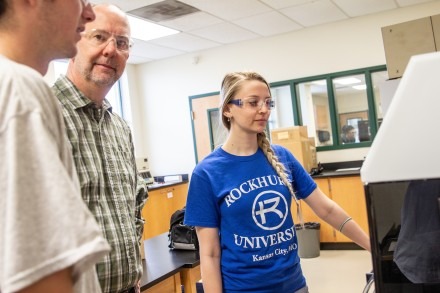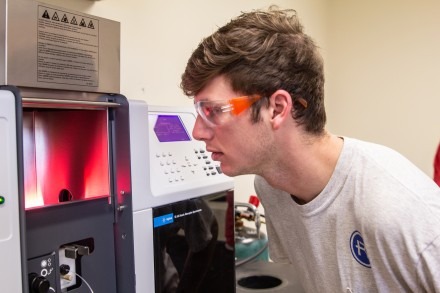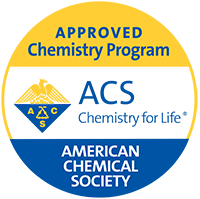A chemistry degree from Rockhurst University leads to success, whether you plan to continue your education in graduate school or go directly into one of the many careers for chemists.


Program Overview
Rockhurst University's chemistry department is accredited by ACS (American Chemical Society), and its science degrees offer a broad spectrum of courses — from organic chemistry to physical chemistry to biochemistry — designed to meet your specific needs and desired vocational objectives. Faculty within our chemistry degree program work closely with you as an individual in the classroom and lab setting and are right there beside you during independent research to provide practical, real-world exposure to important scientific questions and methods.
Image

ACS Accreditation
Our chemistry degree program is accredited by ACS, signifying that this science degree program meets or exceeds national and international chemical education standards. It also differentiates you when looking for chemistry degree jobs because employers typically find graduates of ACS-approved programs to be better prepared for technical employment.
Learning Outcomes
- Proficiency in laboratory skills and in communicating results.
- Analyze chemical problems and develop solutions to those problems.
- Predict how matter interacts with itself and with energy using basic chemical principles.
- Use, critically evaluate and present scientific literature.
- Demonstrate and understand the importance of ethics in scientific work.
Program Outcomes
Chemistry Alumni
"My chemistry education at Rockhurst University was vital in preparing me for graduate school. In addition to the knowledge I gained from classes, my professors provided me with the experiences, the connections, and the mentorship required to succeed in my Ph.D. program."
- Austin Carroll, ’14
3rd year Chemistry Ph.D. student at UC Davis, NSF Fellow
For more from and about Rockhurst University chemistry alumni, click here.
What can you do with a chemistry degree?
Graduates go on to pursue graduate education or chemistry degree jobs in a diverse range of areas including:
- Industry: chemical, pharmaceutical, food, beverages, cosmetics, petroleum, agriculture, environmental, consumer products
- Medicine and health care
- Government research/national laboratories: FDA, EPA, USDA, NIH, NIST, DOE
- Research: medical, pharmacological, material design, environmental
- Chemical manufacturing, product and process development
- Quality assurance/ quality control
- Pharmacy technician and pharmacy sales
- Occupational and environmental safety and health, industrial hygiene
- Forensic chemistry
- Chemical education
Chemical Technician
Toxicologist
Pharmacologist
Analytical Chemist
Forensic Scientist
Synthetic Chemist
Organic Chemist
Oceanographer
Course Map
Degree and class descriptions and requirements can be found by clicking on the course catalog listing below:
Degree Info
- Service-learning opportunities in the community
- Field trips to local pharmaceutical and industrial companies
- Student-faculty undergraduate research
- Opportunity to join our ACS-affiliated student chapter and/or our chapter of Phi Lambda Upsilon (national chemistry honor society)
Teaching & Research Laboratories
- Multiple teaching laboratories in the Science Center serve students in all areas of chemistry, including introductory courses and courses in organic, instrumental, analytical, physical, and biochemistry.
- Our labs are equipped with state-of-the-art instrumentation that students use regularly in both classes and research-based projects
Equipment & Instrumentation
- We have excellent modern atomic absorption, GCMS, FTIR, UV-Vis, Fluorimeter, HPLC, an electrochemical analyzer, and NMR instruments
- Students regularly present their research at regional and national scientific meetings and conferences
- Research labs are designed so students can work on their own projects but also see work being done by others as well, exposing them to multiple projects at once
- The RU chemistry department has ongoing research projects in organic chemistry, computational chemistry, electrochemistry, scientific education, and biochemistry
- Many of our faculty are very active in their research and have multiple publications in their chosen field of chemistry
Faculty Research
Sophomore Year • Chemistry Major Classes
Fall Semester
- General Chemistry (4 hours credit)*
- Calculus I (4)
- Freshmen in Science (1)
- Electives/Core classes (6-9)
Spring Semester
- General Chemistry (4)*
- Calculus II (4)
- Electives/Core classes (6-10)
*Honors General Chemistry may be substituted with Analytical Chemistry taken in the spring.
Sophomore Year • Chemistry Major Classes
Fall Semester
- Organic Chemistry I (3)
- Organic Chemistry Laboratory I (1)
- General Physics I & Lab (4)
- Electives/Core (6-10)
Spring Semester
- Organic Chemistry II (3)
- Organic Chemistry Laboratory II (1)
- General Physics II & Lab (4)
- Analytical Chemistry (4)*
- Electives/Core (3-6)
*Honors General Chemistry may be substituted with Analytical Chemistry taken in the spring.
Find Your Program
Choose topic to quickly find specific program details
